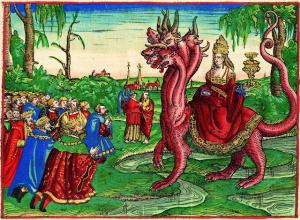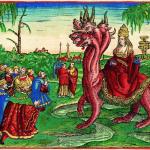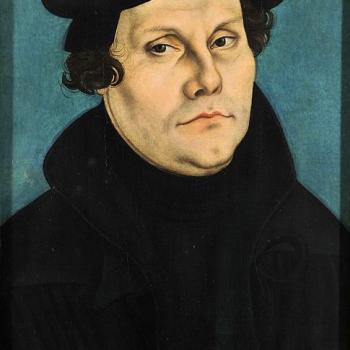Church, Seven Sacraments, Papacy, Saints, Priesthood, & Mariology in the Gospels
The late Steve Hays (1959-2020) was a Calvinist (and anti-Catholic) apologist, who was very active on his blog, called Triablogue (now continued by Jason Engwer). His 695-page self-published book, Catholicism — a collection of articles from his site — has graciously been made available for free. On 9 September 2006, Hays was quite — almost extraordinarily — charitable towards me. He wrote then:
I don’t think I’ve ever accused him of being a traitor or apostate or infidel. . . . I have nothing to say, one way or the other, regarding his state of grace. But his sincerity is unquestionable. I also don’t dislike him. . . . I don’t think there’s anything malicious about Armstrong—unlike some people who come to mind. In addition, I don’t think I’ve ever said he was unintelligent. For the record, it’s obvious that Armstrong has a quick, nimble mind.
Two-and-a-half years later, starting in April 2009 and up through December 2011 (in the following quotations) his opinion radically changed, and he claimed that I have “an evil character,” am “actually evil,” “ego-maniac, narcissist,” “idolater,” “self-idolater,” “hack who pretends to be a professional apologist,” given to “chicanery,” one who doesn’t “do any real research,” “a stalwart enemy of the faith . . . no better than [the atheists] Richard Dawkins or Christopher Hitchens,” with an intent to “destroy faith in God’s word,” “schizophrenic,” “emotionally unhinged,” one who “doesn’t trust in the merit of Christ alone for salvation,” “has no peace of mind,” “a bipolar solipsist,” “split-personality,” and a “bad” man. He wasn’t one to mince words! See more gory details.
I feel no need whatsoever to reciprocate these silly and sinful insults. I just wanted the record to be known. I’ve always maintained that Hays was a very intelligent man, but habitually a sophist in methodology; sincere and well-meaning, but tragically and systematically wrong and misguided regarding Catholicism. That’s what I’m addressing, not the state of his heart and soul (let alone his eternal destiny). It’s a theological discussion. This is one of many planned critiques of his book (see my reasons why I decided to do this). Rather than list them all here, interested readers are directed to the “Steve Hays” section of my Anti-Catholicism web page, where they will all be listed. My Bible citations are from the RSV. Steve’s words will be in blue.
*****
[Chapter 3: Competing Paradigms]
Where was your church before the Reformation?
Where do we find the Roman Catholic church in the Gospels? Where do we find “the church” in the Gospel of Mark? Mark’s Gospel never mentions “the church”. Where do we find “the church” in the Gospel of Luke? Luke’s Gospel never mentions “the church”. Where do we find “the church” in the Gospel of John? John’s Gospel never mentions “the church”. The only Gospel that even mentions “the church” is Matthew’s Gospel. And it mentions “the church” just two times. That’s it! [p. 99]
Where do we find sola Scriptura or denominationalism or “faith alone” in the Gospels? Where do we find sola Scriptura or denominationalism or “faith alone” in the Gospel of Mark? Mark’s Gospel never mentions them. Where do we find sola Scriptura or denominationalism or “faith alone” in the Gospel of Luke? Luke’s Gospel never mentions them. Where do we find sola Scriptura or denominationalism or “faith alone” in the Gospel of John? John’s Gospel never mentions them. I did this parody to highlight the fact that if we want to argue “biblical absence,” Protestantism can offer plenty of that, and it’s rarely addressed within its ranks.
Now let’s address whether “church” is almost entirely absent in the Gospels. I deny this and assert that it is indeed present in the phrase “kingdom of God [or heaven]”. McClintock and Strong Biblical Cyclopedia (“Kingdom of God”) stated:
As external, it is either embodied in the visible Church of Christ, and in so far is present and progressive (Mt 6:10; Mt 12:28; Mt 13:24,31,33,41,47; Mt 16:19,28; Mr 4:30; Mr 11:10; Lu 13:18,20; Ac 19:8; Heb 12:28), or it is to be perfected in the coming of the Messiah to judgment and his subsequent spiritual reign in bliss and glory, in which view it is future (Mt 13:43; Mt 26:29; Mr 14:25; Lu 22:29-30; 2Pe 1:11; Re 12:10). . . . But these different aspects are not always distinguished, the expression often embracing both the internal and external sense, and referring both to its commencement in this world and its completion in the world to come (Mt 5:3,10,20; Mt 7:21; Mt 11:11; Mt 13:11,52; Mt 18:3-4; Col 1:13; 1Th 2:12).
“Kingdom of heaven” in RSV appears 32 times in the Gospel of Matthew. “Kingdom of God” appears four times in Matthew, fourteen times in Mark, 32 times in Luke, and twice in John. So if we add all these together and add the two uses of “church” in Matthew, we have 86 appearances altogether. Taking away the ones that refer to Christ’s kingdom after the Second Coming, there are still quite a bit. Hays’ attempt to argue for a non-Church framework in the Gospels abysmally fails.
In fairness, a concept can be present where the word is absent. In the Gospels there’s a notion of Christian community. But you can’t find the Roman Catholic church anywhere in the Gospels. [p. 99]
Matthew 16:17-19 And Jesus answered him, “Blessed are you, Simon Bar-Jona! For flesh and blood has not revealed this to you, but my Father who is in heaven. [18] And I tell you, you are Peter, and on this rock I will build my church, and the powers of death shall not prevail against it. [19] I will give you the keys of the kingdom of heaven, and whatever you bind on earth shall be bound in heaven, and whatever you loose on earth shall be loosed in heaven.”
This is a “Church” built upon St. Peter as its first leader. Does that sound familiar as any particular Christian communion?
All four Gospels have accounts of the Last Supper, but there’s nothing about a priest officiating at the Eucharist. [p. 99]
Jesus presided over it, and He is the new high priest (Heb 2:17; 3:1; 4:14-15; 5:5, 10; 6:20; 7:26; 8:1, 3; 9:11) and prototype of Catholic priests.
And only one Gospel has a clear reference to Christian baptism. [p. 99]
Hays no doubt refers to Matthew 28:19: “Go therefore and make disciples of all nations, baptizing them in the name of the Father and of the Son and of the Holy Spirit”. He neglects Mark 16:16: “He who believes and is baptized will be saved; but he who does not believe will be condemned.” If he wants to play the game that 16:9-20 is a late addition, read one of many defenses of these verses as Scripture, and a second excellent one. Hays also overlooks John 3:22: “After this Jesus and his disciples went into the land of Judea; there he remained with them and baptized.” And John 4:1-2: “. . . Jesus was making and baptizing more disciples than John [2] (although Jesus himself did not baptize, but only his disciples),”.
Why couldn’t he look these things up? As it is, he now just looks foolish and silly. Nothing is easier than searching the Bible, with today’s marvelous searching technology.
Where are the seven sacraments in the Gospels? Nowhere. [p. 99]
First of all, there is no rule (certainly not in the Bible or the Gospels) that everything in Christianity must be present in the Gospels in the first pace. They are only part of the New Testament. But there is plenty of sacramental indication in the Gospels. We just saw the evidence for baptism. The Eucharist is explicitly laid out in the Last Supper accounts and in John 6, where Jesus dramatically states: “unless you eat the flesh of the Son of man and drink his blood, you have no life in you; he who eats my flesh and drinks my blood has eternal life” (6:53-54), “He who eats my flesh and drinks my blood abides in me, and I in him” (6:56), “he who eats this bread will live for ever” (6:58).
Absolution (reconciliation / confession) is found in John 20:23: “If you forgive the sins of any, they are forgiven; if you retain the sins of any, they are retained” (cf. Mt 16:19; 18:18). The sacrament of marriage is arguably found in Jesus saying: “Have you not read that he who made them from the beginning made them male and female, and said, `For this reason a man shall leave his father and mother and be joined to his wife, and the two shall become one flesh’? So they are no longer two but one flesh. What therefore God has joined together, let not man put asunder.” (Mt 19:4-6).
Ordination is present in “”He who receives you receives me” (Mt 10:40), ” As the Father has sent me, even so I send you” (Jn 20:21) and other similar passages. Extreme Unction / last rites / anointing is implied in all the many healing passages, especially those where death is imminent or has already occurred. Confirmation is found in “Receive the Holy Spirit” (Jn 20:22) and “the Counselor . . . whom I shall send to you from the Father, even the Spirit of truth” (Jn 15:26), and “When the Spirit of truth comes, he will guide you into all the truth” (Jn 16:13).
Where’s the cult of the saints in the Gospels? Nowhere. [p. 99]
It’s implied in Jesus teaching about how the rich man prayed to Abraham in Hades (Luke 16), in Jesus talking to the dead and praying for them when He raised people from the dead, in Moses and Elijah appearing with Jesus and talking to Him during His transfiguration, and in the dead coming out of their tombs and walking around Jerusalem after the crucifixion (Mt 27). Protestant theology is vague in terms of incorporating these extraordinary events into an overall consistent framework. Often, Protestants will simply ignore it as if it doesn’t exist, just as Hays did here!
Where’s the Roman Catholic priesthood in the Gospels? Nowhere. [p. 99]
In Jesus’ commission to His disciples (in addition to granting them the power of absolution, as I already addressed above):
Matthew 10:1, 7-8 And he called to him his twelve disciples and gave them authority over unclean spirits, to cast them out, and to heal every disease and every infirmity. . . . [7] And preach as you go, saying, ‘The kingdom of heaven is at hand.’ [8] Heal the sick, raise the dead, cleanse lepers, cast out demons. You received without paying, give without pay.
Matthew 28:19-20 Go therefore and make disciples of all nations, baptizing them in the name of the Father and of the Son and of the Holy Spirit, [20] teaching them to observe all that I have commanded you; . . .
Who, for example, casts out demons today? For the most part, it’s Catholic priests performing exorcisms.
Where’s the papacy in the Gospels? Nowhere. [p. 99]
Nonsense. It’s clearly in the portrayed leadership of Peter among the disciples (Petrine primacy), and in Jesus building His Church upon him (I already cited above). Here is much more:
Matthew 16:19b . . . whatever you bind on earth shall be bound in heaven, and whatever you loose on earth shall be loosed in heaven.
“Binding” and “loosing” were rabbinical terms, meaning to “forbid” and “permit” with reference to the interpretation of the law, and secondarily to “condemn” or “acquit.” Thus, St. Peter was given the authority to determine the rules for doctrine and practice. Bishops also these powers (Mt 18:17-18; Jn 20:23), but Peter was the only apostle who received them singularly, by name (making him preeminent). Peter was regarded by Jesus as the chief shepherd after Himself (Jn 10:11; 21:15-17): over the universal Church. Jesus told him to “feed my lambs” and “tend my sheep” and “feed my sheep.”
Jesus uniquely prayed for Peter, that his “faith may not fail”, and exhorted him to “strengthen” his “brethren” (Lk 22:32), and informed him that he had received divine knowledge by a special revelation (Mt 16:17). Jesus uniquely associated Himself and Peter in the miracle of the tribute-money (Mt 17:24-27), and taught from Peter’s boat. A miraculous catch of fish followed (Lk 5:1-11).
Peter’s name occurs first in all lists of apostles (Mt 10:2; Mk 3:16; Lk 6:14). Matthew even called him the “first” (10:2). He is almost without exception named first whenever he appears with anyone else. He alone among the apostles received a new name, Rock (Jn 1:42; Mt 16:18). The two disciples on the road to Emmaus (Lk 24:34) distinguished the Lord’s post-Resurrection appearances to Peter from those to other apostles.
Peter is often spoken of as distinct among apostles (Mk 1:36; Lk 9:28, 32), and his name is always the first listed of the “inner circle” of the disciples (Peter, James and John – Mt 17:1; 26:37, 40; Mk 5:37; 14:37). He’s mentioned more often than all the other disciples put together: 191 times (162 as Peter or Simon Peter, 23 as Simon, and 6 as Cephas). John is next (48). In the entire NT, his name is mentioned even more than Paul’s.
Peter first confessed Christ’s divinity (Mt 16:16), first set out for, and entered the empty tomb (Lk 24:12; Jn 20:6), and led the apostles in fishing (Jn 21:2-3, 11). He was often the central figure in dramatic gospel scenes such as Jesus’ walking on the water (Mt 14:28-32; Lk 5:1 ff., Mk 10:28; Mt 17:24 ff.). He alone cast himself into the sea to come to Jesus (Jn 21:7). He was often the spokesman for the apostles (Mk 8:29; Mt 18:21; Lk 9:5; 12:41; Jn 6:67 ff.). There is much more in the entire NT.
Where’s the Immaculate Conception in the Gospels (or anywhere in the NT)? Nowhere. [p. 99]
The essence of the Immaculate Conception (a sinless Mary) is found in Luke 1:28 and the word kecharitomene (“full of grace”), once scrutinized in depth, especially in light of what Paul teaches about grace, as I have written about. There are also other biblical analogies that can be brought to bear, including (in the Gospels), the similar sanctity of John the Baptist:
Luke 1:15 for he will be great before the Lord, and he shall drink no wine nor strong drink, and he will be filled with the Holy Spirit, even from his mother’s womb.
Where’s the Assumption of Mary in the NT? Nowhere. [p. 99]
It’s implied in many biblical analogies of persons going to heaven in an extraordinary way, in Revelation 12, and it follows deductively from her Immaculate Conception. Bodily death and decay are the result of sin and the fall of man (Genesis 3:16-19; Psalm 16:10). An absence of actual and original sin would allow for instant bodily resurrection. It’s as if Mary goes back to before the fall (for this reason the Church fathers call her the “New Eve”). Jesus’ resurrection makes possible universal resurrection and redemption of our bodies as well as souls (1 Corinthians 15:13-16). Mary’s assumption is the “first fruits,” sign, and type of the general resurrection of all (created) mankind; she exemplifies the age in which death and sin are conquered once and for all.
Now, a Catholic apologist might object that it’s anachronistic to expect a blueprint of the church in the Gospels. But is that an unreasonable expectation? [p. 100]
It’s unreasonable to find a fully developed “blueprint” but all the essentials are there, as I have just shown. Hays kept claiming that all of this was “nowhere” in the Gospels and NT. He was dead wrong.
Catholic apologists tell us that the Roman Catholic church was directly founded by Jesus Christ. [p. 100]
Yes, because it’s laid out clear as day in Matthew 16.
Catholic apologists tell us that Jesus instituted the seven sacraments. So it’s a reasonable expectation that when we compare the Roman Catholic church to the Gospels, we find something in the Gospels recognizably corresponding to the Roman Catholic church. [p. 100]
Yes it is, which is why I took the time to answer these questions. If Steve Hays were alive he would then have the responsibility to counter my answers. But he wouldn’t have done so. Nor will anti-Catholics today do so (they almost certainly will not). That’s fine with me. If the Catholic apologetic from Scripture goes out unopposed from my blog (over 4,200 articles), and my 51 books, then that’s terrific. People will receive undiluted, undistorted theological and spiritual truth. I keep producing Scripture, and the leading anti-Catholics (all of whom used to respond at least cursorily to my arguments) deliberately ignore it (pretend that I don’t exist). Let them. No skin off of my back. I keep persuading people, by the grace of God, and if this happens with no opposition taking place, so be it!
A Catholic apologist might counter that Jesus indirectly founded the Roman Catholic church by establishing the initial conditions, then leaving the rest to theological development. Suppose we grant that for the sake of argument. If so, why can’t we claim the Protestant Reformation as an intended theological development? [p. 100]
We can insofar as it continues apostolic, patristic, Catholic tradition. We cannot where it departs and introduces novelties not before taught by the universal Church (which it massively did; for example, Luther alone departed in at least fifty ways by 1520, even before his excommunication).
***
Practical Matters: Perhaps some of my 4,200+ free online articles (the most comprehensive “one-stop” Catholic apologetics site) or fifty-one books have helped you (by God’s grace) to decide to become Catholic or to return to the Church, or better understand some doctrines and why we believe them.
Or you may believe my work is worthy to support for the purpose of apologetics and evangelism in general. If so, please seriously consider a much-needed financial contribution. I’m always in need of more funds: especially monthly support. “The laborer is worthy of his wages” (1 Tim 5:18, NKJV). 1 December 2021 was my 20th anniversary as a full-time Catholic apologist, and February 2022 marked the 25th anniversary of my blog.
PayPal donations are the easiest: just send to my email address: apologistdave@gmail.com. You’ll see the term “Catholic Used Book Service”, which is my old side-business. To learn about the different methods of contributing, including 100% tax deduction, etc., see my page: About Catholic Apologist Dave Armstrong / Donation Information. Thanks a million from the bottom of my heart!
***
Photo credit: The Whore of Babylon (workshop of Lucas Cranach): colorized illustration from Martin Luther’s 1534 translation of the Bible [public domain / Wikimedia Commons]
***
Summary: The late Steve Hays was a Calvinist and anti-Catholic writer and apologist. This is one of my many critiques of Hays’ “Catholicism”: a 695-page self-published volume.

















